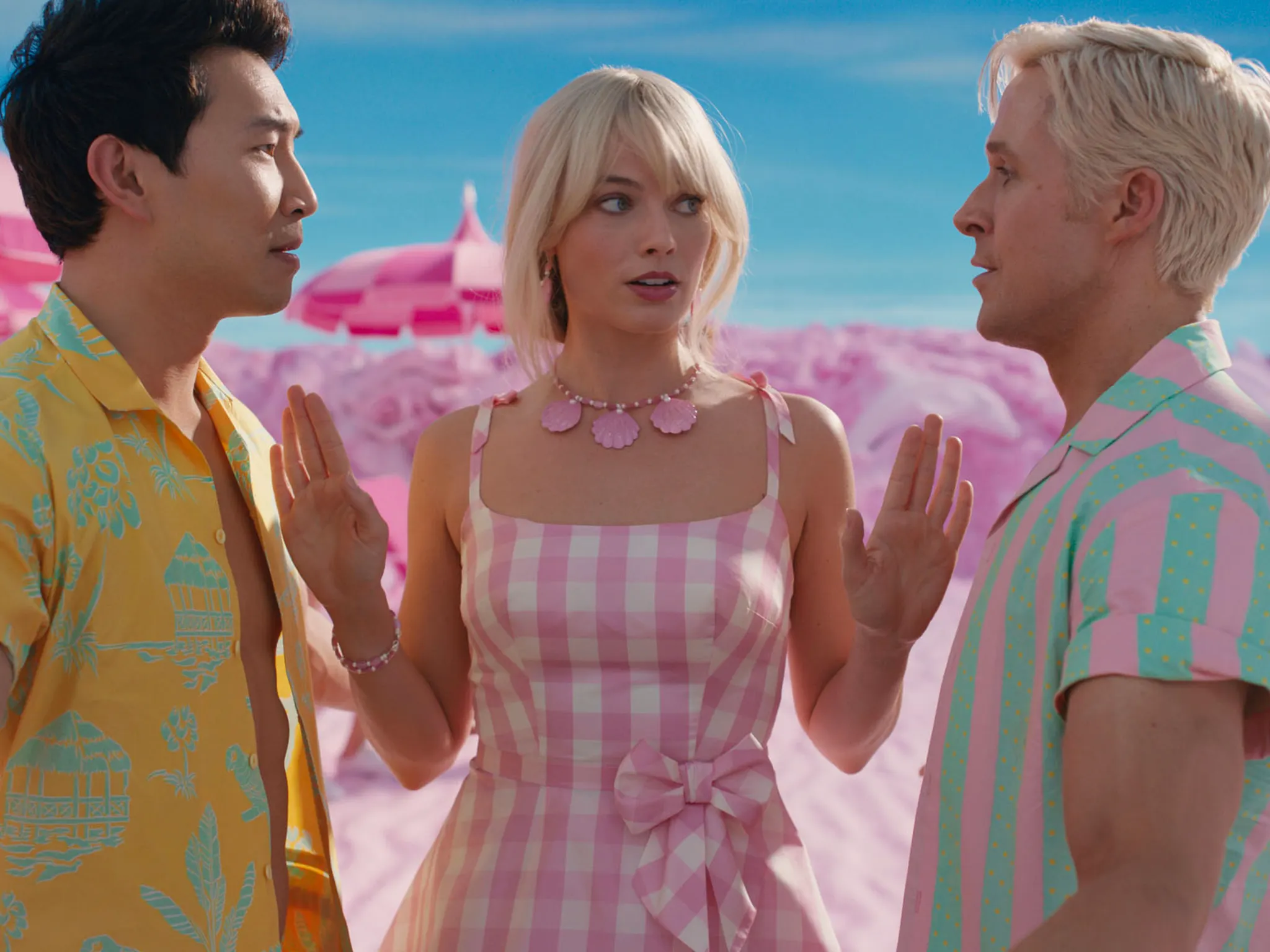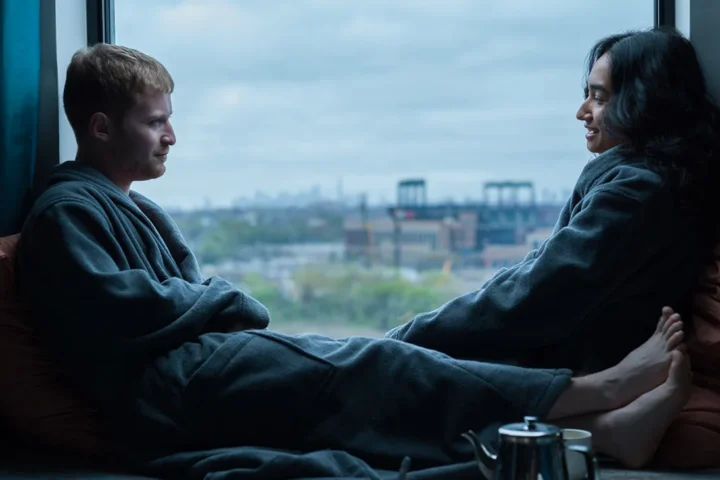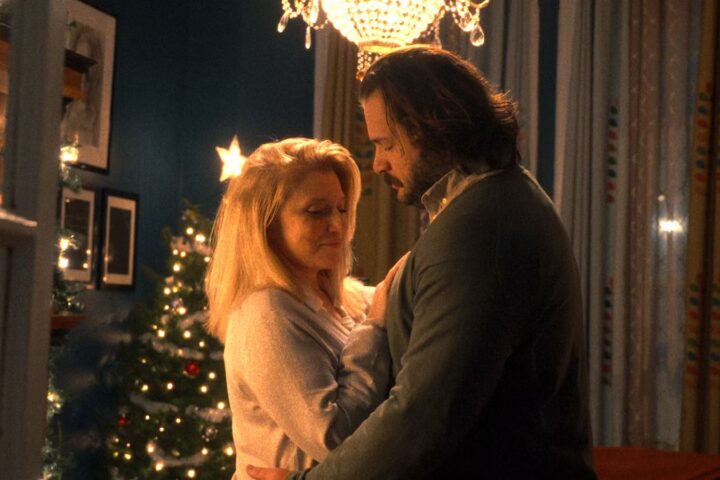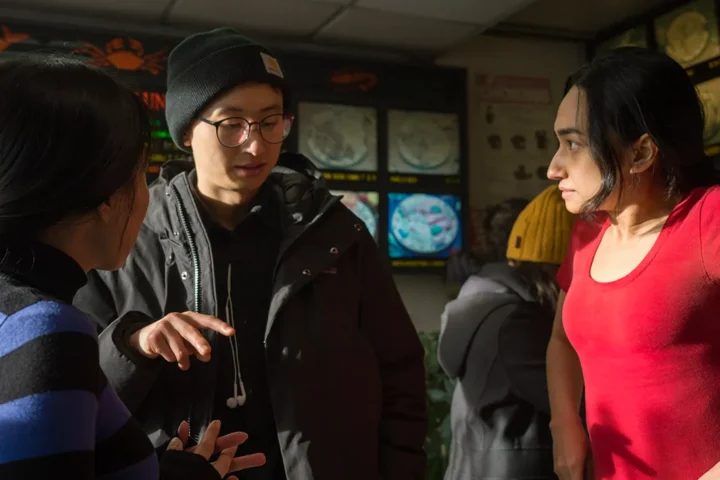Perhaps the biggest surprise of the movie year—or two of them—is that Greta Gerwig’s much-anticipated Barbie has become a runaway cultural moment in a way a movie hasn’t landed in the zeitgeist in perhaps years, and that—delightfully—it’s actually good (and frequently very good).
In a picture that was kept under wraps by studio Warner Brothers until the week of release, director Gerwig, who co-wrote the screenplay with Noah Baumbach, has eschewed mere product marketing tie-ins in favor of a funny, incisive and surprisingly touching meta-level picture, a social comedy about the impossibility of women’s roles in the modern world and perhaps the most pointed American satire in recent memory. While painted in candy-colored pastels and rendered in mostly broad strokes, Barbie‘s sociopolitical critique does not pull punches in a movie that is commercial and subversive, inventive and more than a bit magical.
It takes a moment to settle into Gerwig’s hyper stylized, outsized and uber-performative vision of a “Stereotypical Barbie” who ultimately buckles under the unrealistic expectations of womanhood before developing an enlightened new consciousness. Yet once you do, Gerwig’s sure-handed grasp of tones, themes and bold aesthetic is unmistakable. The movie is also a shot of summer movie fun, and then some.
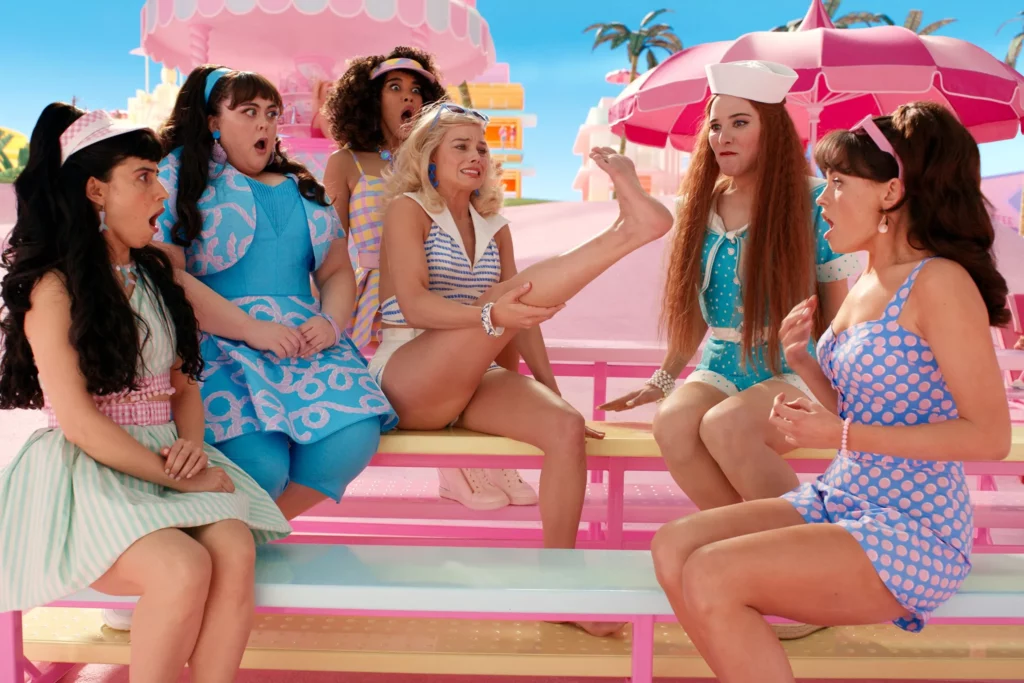
Picture opens in the plastic-perfect utopia of Barbieland, superbly conceived by production designer Sarah Greenwood and lensed by two-time Oscar winning DP Rodrigo Prieto, where all Barbies (including Pregnant Barbie, a Mattel misadventure) exist in perfect harmony. Theirs is a world of the highest accomplishments: Barbie presidents, Nobel winners, doctors and novelists comprising this genius-level world of women.
Stereotypical Barbie, whom “everybody thinks of when they think of Barbie,” is brought to bouncy, buoyant life by a winning Margot Robbie at her comic best, a model of perfect grace and beauty in a magical world where every Barbie, played by the likes of a smart Issa Rae, Hari Neff and even popstar Dua Lipa, lives in her super saturated Dream House, each a model of aesthetic perfection. They are also superiors to Barbieland’s many Kens, including a scene-stealing Ryan Gosling, a blonde and muscled beach boy, and Simu Liu, displaying a real flair for comedy, each of whom spends his days on the beach hoping to impress Barbie and thus win her affections.
Trouble brews in paradise as Barbie’s perfect existence tilts on its access, her mind drifting to thoughts of mortality, morning shower going cold, feet flatly touching ground and—egads!—cellulite! Enter Weird Barbie (played with signature whip-smart elevation by Kate McKinnon), outcast since her human owner in the real world chopped her hair, bent her into permanent splits and otherwise abused her former visage. Barbie’s solution, according to Weird Barbie, is to enter the real world and track down the little girl who owns her, a reconciliation that will restore her to perfection.
Gosling’s Ken in tow, Barbie lands on Venice Beach, and it’s here that the film picks up satirical steam as the pair, rollerblading in blindingly colored 80s’ spandex, quickly observes this strange new world where men hold the power—one where Ken can’t seem to get a job but nonetheless learns about a little notion named the patriarchy. Barbie teams up with a cynical adolescent (Ariana Greenblatt) who deems her a symbol of “fascist” capitalism and beauty standards, and the girl’s frustrated Mattel exec mother played by a very good America Ferrara, delivering a pungent monologue about the quagmire of being a modern woman (which received applause at the screening I attended).
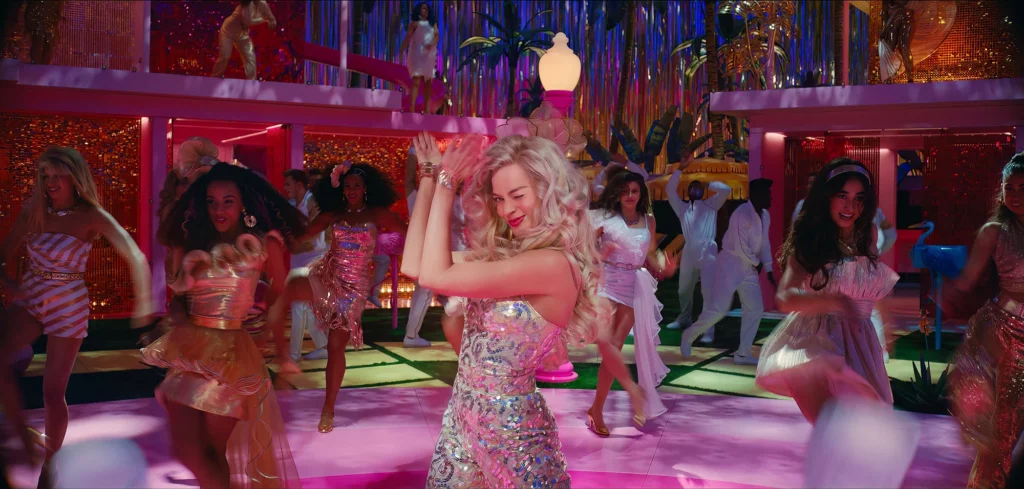
Barbie eventually lands at creator Mattel, where we meet CEO Will Ferrell (on his A-game) and a suited-up team of white executive males deciding—what else?—Barbie’s livelihood. Yet instead of assisting Barbie with her real world dilemma and growing confusion over its upside down gender roles, their solution is to carefully coerce her back into her life-sized product box and whisk her back to Barbieland.
Barbie and company eventually do find their way back to Barbieland, where things have radically changed, Ken having brought real world patriarchal attitudes back to paradise, where the Kens now have all the power and Barbies have been brainwashed, relegated to suppress their former independence. It’s here that Gerwig takes on modern gender warfare by savagely, comically condemning straight male fragility and objectification of women, and what accomplished women must give up to cow-tow to the male ego. Meanwhile, the new Kens—all toxic macho posturing and battling each other for dominance while attempting to change Barbieland’s government and constitution—are oblivious to the Barbie uprising happening right in front of them.
Across this very winning picture, Robbie, a marvel of comic prowess, evolves from plastic dream girl to radiant real woman, facing an existential crisis of her identity and place in the world. Should she stay in the safe, “perfect,” female led Barbieland, or make her way into the unpredictable real world with all of its patriarchal imperfections? In the picture’s closing scenes, where a great Rhea Perlman shows up as Barbie inventor Ruth Handler, Robbie brings real heart to her contemplation of “Who am I? What next?”
That the picture’s brilliant final bit of dialogue, the best closing line in ages, lands so successfully is a testament to its star’s dexterity, effortlessly navigating the comedic and poignant. This comes as no surprise for those paying attention to the Australian, double Oscar nominee delivering diverse screen portraits across a string of pictures like I, Tonya, Mary Queen of Scots, Bombshell and last year’s unfairly maligned period Hollywood epic Babylon, which found her at her career best. Her Barbie comes very close.
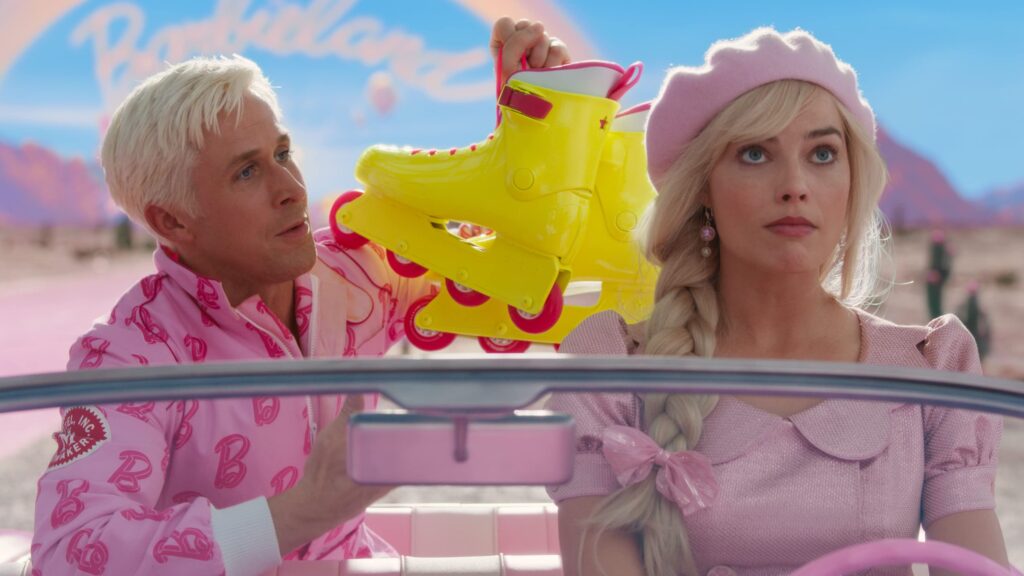
Much has been written about the puppy dog-eyed Gosling stealing this very sparkling show, and his ebulliently clueless Ken gets a juicy arc, one where Gerwig allows him to sing, twice, tapping into his childhood toolkit from his stint next to Britney and Justin on The Mickey Mouse Club (or perhaps more recently, his impressive musicality in 2016’s La La Land). And although his sunny Ken is the in-spite-of-himself architect of Barbieland’s dark clouds, the beaming geniality and emotional comedy in Gosling’s work here is great fun in its pointed lampoon of male fragility. This is a big star turn, and one that should catapult the forty-two-year-old actor back to movie star status.
Gerwig, working commercially but infusing her third picture (after the acclaimed Ladybird and Little Women) with very real observations (suitable for adolescents and up) on gender inequity, female empowerment and the male ego, ultimately contemplates the kind of world in which a progressive, modern woman might ultimately choose to live. She must be credited for an achievement antithetical to the modern blockbuster, foregoing the cynicism of Hollywood commercial manipulation to deliver a personal American movie about something genuinely important, and one that is going to sell better than probably any other this year. In 2023 she is the rare American filmmaker with something to say, and in Barbie, has found the perfect muse. And special mention goes to Helen Mirren, narrating the picture and getting a fourth-wall-break line that, like much of Barbie, brings down the house.
3 1/2 stars
